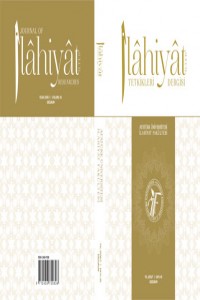Abstract
İnsanı diğer canlılardan ayıran ve onu sorumlu kılan temyiz gücü, düşünme ve anlama
melekesi olan akıl, Kur’an-ı Kerim’e göre insanı insan yapan, onun her türlü aksiyonlarına anlam
kazandıran ve ilahî emirler karşısında insanın yükümlülük ve sorumlu luk altına girmesini
sağlayan özelliktir. Osmanlı toplumunda düşüncenin aktarıldığı en önemli vasıtalardan biri
şiirdir. Çoğu iyi eğitim almış olan şairler, bu malumatlarını sanat zemininde şiir diliyle
aktarmışlardır. Divanlar incelendiğinde bu husus çok net olarak görülecektir.
Bu çalışmayla başta Kur’an ve tasavvuf olmak üzere Yunan mitolojisine kadar uzanan bir
muhteva zenginliği içinde eser veren divan şiirinde akıl tasavvurunu ve bu tasavvurun sanat
zemininde nasıl işlendiğini, belli özellikleriyle temayüz etmiş şairlerin eserlerinden hareketle
incelemek istiyoruz.
References
- Divan Şiirinde Akıl Tasavvuru
Abstract
The concept of intellect can be described as the ability of discernment and mental faculty of
thinking and understanding, which distinguishes the human beings from other creatures and at
the same time which brings responsibility to him. According to the Holy Book Quran; this is the
very quality which makes him a real human being and makes all of his acts meaningful. Besides,
by means of our intellect, we are held responsible and liable before divine commands. One of the
most important means of conveying thoughts in Ottoman society is the poem. Most of the poets
who had received a good education have reflected their knowledge through poetic language on an
artistic ground. This can be observed clearly when we examine the divans (collection of poems).
In this study, we aim to investigate the concept of intellect in Ottoman poetry and how it was
dealt with on an artistic ground, based on works of some outstanding poets, who composed
poetry within a wide range of contents, such as first and foremost the Quran and Sufism and also
Greek mythology.
Keywords
References
- Divan Şiirinde Akıl Tasavvuru
Details
| Primary Language | Turkish |
|---|---|
| Journal Section | Research Articles |
| Authors | |
| Publication Date | June 30, 2016 |
| Submission Date | April 11, 2016 |
| Published in Issue | Year 2016 Issue: 45 |
Cite
Cited By
SEHÎ BEY DİVANI’NDA GÖNÜL
Bayterek Uluslararası Akademik Araştırmalar Dergisi
https://doi.org/10.48174/buaad.1583941
ÂŞIK PAŞA’NIN GARÎB-NÂME ADLI ESERİNDE GEMİNİN FAALİYET VE İSTİKAMETİ İÇİN GEREKLİ SEKİZ UNSUR
Selçuk Üniversitesi Selçuklu Araştırmaları Dergisi
https://doi.org/10.23897/usad.1161192
Journal of Ilahiyat Researches is licensed under a Creative Commons Attribution-NonCommercial-NoDerivatives 4.0 International License.


